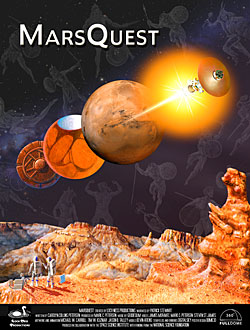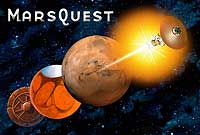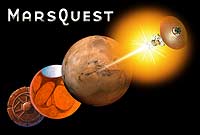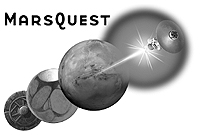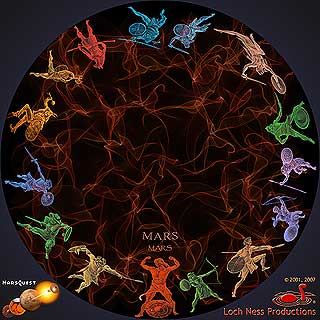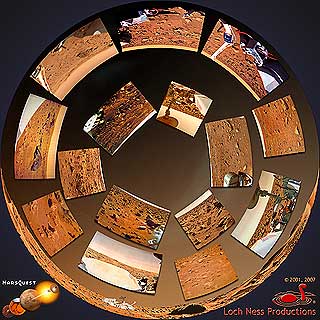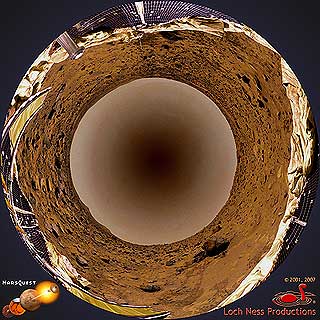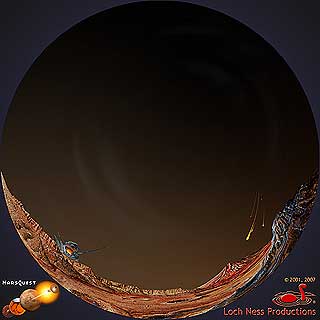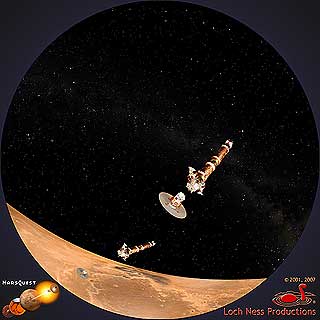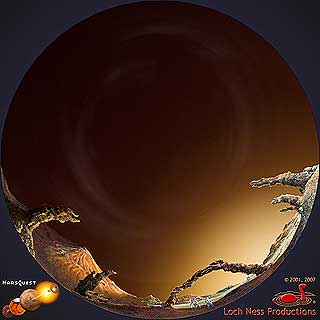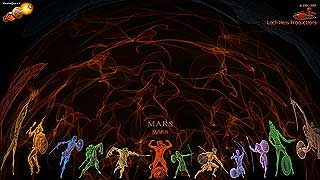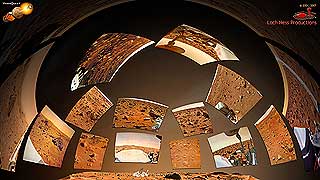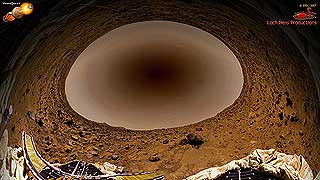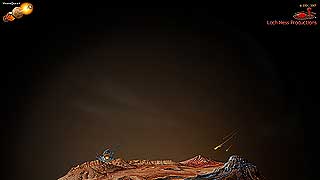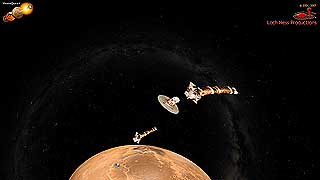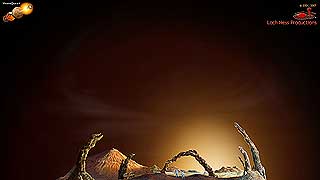MarsQuest
Come along on a captivating scientific and historical exploration of the planet Mars!
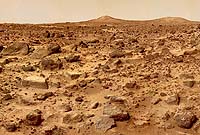 In the first section, "Homage," we trace Mars through history — from an "incantation" of the various War God forms given by different cultures, to the early observations of Schiaparelli and Lowell, and the infamous "canals" which led to science-fiction stories about Martians. We hear excerpts from H. G. Wells "War Of The Worlds" and Edgar Rice Burroughs's "Barsoom" novels.
In the first section, "Homage," we trace Mars through history — from an "incantation" of the various War God forms given by different cultures, to the early observations of Schiaparelli and Lowell, and the infamous "canals" which led to science-fiction stories about Martians. We hear excerpts from H. G. Wells "War Of The Worlds" and Edgar Rice Burroughs's "Barsoom" novels.
"Mars In Focus" details the Mars of our time — as seen in the night sky, through binoculars and telescopes, and from our Mars explorations. Mission findings from more than a quarter century of spacecraft missions feature reports on Mars weather, climate, and areology. We compare the climate and terrain of Earth and Mars, and present the current thinking about the areologic history of the planet, and a rationale for future exploration.
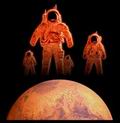 "Mars In The Future" examines where on Earth we can prepare to live on Mars, what will be needed to get crewed missions there, and what the first landing may be like.
"Mars In The Future" examines where on Earth we can prepare to live on Mars, what will be needed to get crewed missions there, and what the first landing may be like.
The show ends with "Rhapsody On A Red Planet," a poetically-styled "ode to Mars", this time from a future perspective; an eloquent soliloquy tracing the efforts that led to our first footsteps onto the desolate and dusty Martian surface.
Along with its sister planetary shows MAGELLAN: Report From Venus and The Voyager Encounters, MarsQuest is an excellent way to present the wonders of the solar system to audiences of all ages.

 Running time: 40:26
Running time: 40:26
Age level: General public
Year of production: 2007 fulldome,
2001 classic
Narrated by Patrick Stewart
Words expertly crafted by Carolyn Collins Petersen
Stereo soundtrack with original music by Geodesium
Produced in collaboration with the Space Science Institute of Boulder, Colorado,
with funding by a grant from the National Science Foundation.

MarsQuest
Science Education Content
The focus of MarsQuest is to present Mars via a set of multidisciplinary themes. These ideas are woven throughout the program and help relate the information presented in the show to the lives of students, families, and the general public.
Show content is relevant in the following subject areas:
Physical Sciences:- Positions and motions of Earth and Mars
- Mars and Earth orbits, relative positions over time
- Orbital effects on climate, seasons
- Objects in the sky: Earth, Mars, Mars satellites
- Comparative planetology of Earth and Mars
- Mars environment, climate change, evolution, surface
- The search for life on Mars and likely environments where it might exist
- Mars through binoculars, telescopes
- Exploration of Mars by spacecraft missions
- Technological challenges of future explorations
- Science drivers for Mars exploration
- Remote sensing and spacecraft
- Technological planning for future Mars studies
- The ancient perception of Mars as a war god
- The scientific exploration of the planet
- Mars in science fiction and fantasy
- Future human exploration of the planet
Q. How do you handle updates for the latest discoveries?
SHORT ANSWER: We don't. You may.
LONG ANSWER: MarsQuest was originally produced in 2001; the fulldome version based on the classic show's content was created in 2007. There are no plans at this time to update the show. While we are fortunate that there are new images and data being returned from Mars every day, it's simply impractical for us to record new narration and change the show with every new press release. We can't simply toss in newly released images, because the show's existing narration naturally won't describe and explain them. And we don't allow editing of the show (see the Performance License Agreement).
So, in pre-show welcoming remarks to the audience, we suggest that presenters include words to the effect:
"MarsQuest was produced in 2001. It provides an overview of humanity's fascination with the red planet. As you know, there are several spacecraft and ongoing missions at Mars right now. After MarsQuest is over, I'll be back to show you some brand new images I just downloaded from JPL."
Then go for it... afterward!
Q. What's your source for the Mars god names?
by Carolyn Collins Petersen
LONG ANSWER: It seems we're always answering inquiries about the origins of the Mars gods names we use in MarsQuest. When I first wrote The Mars Show back in 1988 I sifted through old astronomy and mythology books to find a dozen or so names for Mars. Throughout history Mars has held fascination as a god or some other special personage in the skies, and has most often (but not always) been embodied as a god of War. The history of Mars goes back to earliest civilizations, which is not surprising considering how visible Mars is and how easy it is to track (and map) its movements. In my research I often found that the name for Mars was bequeathed from one civilization or culture to another, borrowed as needed, and sometimes imposed by a conqueror onto the pantheon of deities revered by the vanquished.
I've listed below the names for Mars that we used in the show, along with brief explanations of the region of the world from which they came, and in some cases, some relevant cultural information. These are not by any means the only names that were ever used for Mars, they're just the list that we chose to dramatize this show. Below the names I've listed some of the sources I used, along with some Web sites which may be of interest to you.
![]() Horus the Red: Egyptian, variant on Red Horus, which is translated from a 19th and 20th-dynasty name: "Heru-tesher." (3, 9)
Horus the Red: Egyptian, variant on Red Horus, which is translated from a 19th and 20th-dynasty name: "Heru-tesher." (3, 9)
![]() Morning Star (Who Overcomes Evening Star). This comes from the Skidi Pawnee of North America. (4)
Morning Star (Who Overcomes Evening Star). This comes from the Skidi Pawnee of North America. (4)
![]() Nabu — A Babylonian name (5) mostly associated with the planet Mercury, but assigned by the Sumerians to the planet Mars. For them, he was the god of wisdom. There are also some links to Nabu as a Chaldean god. (6)
Nabu — A Babylonian name (5) mostly associated with the planet Mercury, but assigned by the Sumerians to the planet Mars. For them, he was the god of wisdom. There are also some links to Nabu as a Chaldean god. (6)
![]() Nirgal (also spelled Nergal) — worshiped in Babylonia and Assyria; the god of war; sometimes associated with the Sun; mostly associated with death and destruction.
Nirgal (also spelled Nergal) — worshiped in Babylonia and Assyria; the god of war; sometimes associated with the Sun; mostly associated with death and destruction.
![]() Urbarra — believed to be of early Sumerian origin.
Urbarra — believed to be of early Sumerian origin.
![]() Salbatanu — this name is of Babylonian origin. (1)
Salbatanu — this name is of Babylonian origin. (1)
![]() Verethragna — of Persian origin. (1)
Verethragna — of Persian origin. (1)
![]() Mustabarru — Babylonia (7)
Mustabarru — Babylonia (7)
![]() Lohitanga — Sanskrit (one of many variants on the name of a war god associated with the Red Planet)
Lohitanga — Sanskrit (one of many variants on the name of a war god associated with the Red Planet)
![]() Pyroeis — this is an early Greek name for Mars (3)
Pyroeis — this is an early Greek name for Mars (3)
![]() Mirikha — another Sanskrit variant (3)
Mirikha — another Sanskrit variant (3)
![]() Artagnes — Persian (found in various sites around Turkey and what was Persia). (7)
Artagnes — Persian (found in various sites around Turkey and what was Persia). (7)
![]() Angares — a variant of Angaraka (another Sanskrit name) (3)
Angares — a variant of Angaraka (another Sanskrit name) (3)
![]() Ares — Greek (3)
Ares — Greek (3)
![]() Mars — Roman (3)
Mars — Roman (3)
1. Encyclopedia of Middle-Eastern Mythology and Religion, 1993.
2. Blunck, Jürgen. Mars and its Satellites, Jurgen Blunck, Exposition University Books, 1982.
3. "Origins of the names of Planets and Satellites," Carl Masthay, The Planetarian, Vol. 16, No. 4, October 1987.
4. Chamberlain, Von del. When Stars Came Down to Earth: Cosmology of the Skidi Pawnee Indians of North America, Ballena Press/Center for Archaeoastronomy (Smithsonian Institution), 1982.
5. The Ancient History Sourcebook Web page: http://www.fordham.edu/halsall/ancient/asbook.html
6. The Probert Encylopedia: http://www.probertencyclopaedia.com/index.html
7. http://www.worldwideschool.org/library/books/sci/history/AHistoryofScienceVolumeI/chap9.html
8. http://www.adiyamanli.org/mt_nemrut.htm — This a tourist site, but it also has a brief description of the gods' names and some of their lineages.
9. Budge, E.A. Wallis. The Gods of the Eyptians, Studies in Egyptian Mythology.
Volume 2. Dover Publications, New York, 1969.
Here's where we get to share our show philosophy with you, the same way that directors and producers often explain their work on those extended DVD versions of popular movies. Enjoy!
Carolyn's Musings about the story we tell in MarsQuest
Introduction
MarsQuest's predecessor show The Mars Show was first born as an idea I had during a Case for Mars conference I attended at the University of Colorado in 1987. At that (and previous) meetings, discussions centered on future exploration of the Red Planet. Technologies on the table included some of the current rovers and orbiters that have been exploring Mars since the 1990s. But some engineering marvels we discussed were solely meant for use on the Red Planet, once humans had established a beachhead for exploration. These included gliders for flight over the Martian landscapes, drilling equipment to dig into the permafrost, and little Martian dune buggies that would let explorers into canyons and valleys inaccessible by other means.
So when it came time to write a planetarium show about Mars, I knew that in addition to the usual "science reports" (temperatures, wind speeds, and surface characteristics), I wanted to tell a more human-oriented story. The scientific exploration of Mars continues on day after day, but telling the human side along WITH that science — that was my challenge.
The Mars Backstory
To get myself into a frame of mind where I could help take audiences to Mars, I imagined a man flying to his home to a future city on Mars. He's looking out over the landscapes as he travels, and as he goes along, he muses to himself about how humans first saw Mars as a god of war, then discovered it was another world. He chuckles to himself about the early ideas that there were Martians living on the Red Planet, and diverts himself with tales told by Edgar Rice Burroughs and other science fiction greats. He reminisces about the scientific exploration that began in the second half of the 20th century and continued into the 21st; studies that taught us as much as we could learn about Mars — from a distance. He recalls the earliest days of human exploration of Mars, and as he's landing in his home city, he fondly points out Earth in the darkening Martian twilight, and ends by reminding himself (and us) that "now... we are the Martians."
That was what I wanted. But, it was NOT possible to have a character "on screen" in the planetarium show, especially back in the days when all we had to project images were slide projectors. So, our main narrator became a sort of spoken guide to Mars and human-Mars history — a disembodied storyteller explaining things as we go along in the show. He tells a creditable story about Mars exploration — and that story relies on much cultural, historical, and scientific background. It is only when we get to the epilogue of the main show, called "Rhapsody on a Red Planet" that we get back to a semblance of my original storyline. He speaks more directly to Mars, and to us, in an intensely touching way, about how Mars is now our second home. It is one of the most memorable scenes in any planetarium show, and people have loved it in the show ever since the first 1988 version.
Bringing Viewers Home to Mars
MarsQuest is based very closely on our original The Mars Show, with the obvious scientific updates. But, it also has some touches I thought of after the first production. For example: place names.
I have always assumed that one day people will go to Mars and explore it for themselves. And, as with any travel to a strange new place, there's a certain amount of mental and physical preparation that people go through. You check up the climate, the weather, the terrain, the names of places. Thus, a large part of my story became a "familiarization" exercise for the audience. I also wanted them to be able to pronounce the place names — just as you might do here on Earth, if you've never been to a foreign country. You get a guide book and you start saying the names of the places you'll be visiting — Lyons or New Abu Simbel or Puerto Montt or Las Vegas, Nevada, for example. On Mars, the names are as exotic as any Earth destination: Utopia Planitia, Cydonia Mensae, Noctis Labyrinthus, Candor Chasma, Vallis Marineris. It was especially satisfying to give our narrator these terms, and listen to him speak them with authority and familiarity.
The same idea lay behind the incantation of the Mars gods names at the beginning of the show. They were calculated to bring to audiences a taste of the awe that our ancestors must have felt when confronted with this powerful and unknown deity in the sky. I always hoped that audience members would try to say these names — both of the gods AND the places on Mars where our future explorers will one day walk.
The Science of Mars
When I rewrote MarsQuest from the old Mars Show, of course I updated the science. But, I also knew that it would be impossible to continually update the show after each new mission and discovery.
We now have enough missions to Mars that there are images flowing back to Earth each day. I sometimes think of it as "webcam on Mars." Like a webcam, you get a constant flow. Sometimes there are good, exciting images; other times it's "another picture of another rock." All of this is important in the long run when it comes to detailed scientific understanding of Mars's evolutionary history. But, for a general presentation about Mars, the big picture is what's important.
So, I wrote the show as generally as I could. The story that it tells does NOT go out of date, and it allows all audience members to walk away afterwards with a good general working knowledge of what we've discovered on Mars.
For example, in the central section of the show "Mars in Focus," I use material from several missions to illustrate how we know what we know about climate changes on Mars, landscape evolution, and possible scenarios for water on Mars — both now and in the past. We illustrate the section with images from several missions that give a general look at the landscapes, cloud covers, and discoveries.
It's a chronicle of events stretching across thousands of years of human history and touching on our fascination with Mars. As such, it's a multi-faceted, cross-disciplinary work, with enough material to spark the curiosity of artists and writers as well as scientists and engineers. It's meant to touch you, stir your emotions a bit, and take you to Mars to learn the place names and weather and history of this exploration target. Along the way, if the story touches you the way I hope it does, you will learn as much about humans, our fears and hopes, and our explorations, as you do about Mars. For, after all, at some level, we ARE the Martians.
Select link to preview the trailer.
Shows from Loch Ness Productions come with English language soundtracks standard. Translated soundtracks are provided as additional items, not substitutes for the English ones. If your show's movies contain multiplexed audio, you'll receive separate movie files for each language.
Don't see the language you want? Let's work together to create it. Read more here!



